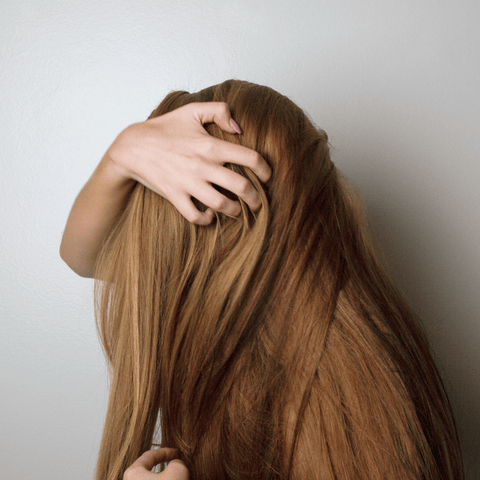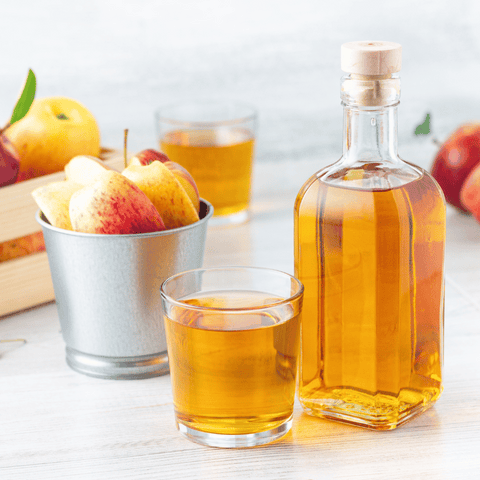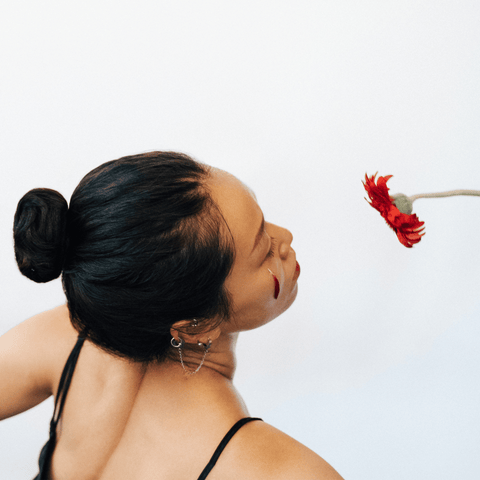Stress, hormones, allergies... There are many causes of an itchy scalp. The end result is often the same: the appearance of dandruff and even scabs in some cases. To regain a healthy scalp , discover the causes of this itching and the practical tips and best natural products to overcome it.
To save time and get a complete assessment of your hair and scalp, LAO has combined its knowledge into a holistic diagnosis that can be done in just 1 minute. It's up to you!
Causes of an Itchy Scalp
Scalp can become itchy due to several external or internal factors.
Seborrheic dermatitis or psoriasis, for example, are skin conditions that cause daily redness, itching and dandruff.
Some fungal infections can also cause severe scalp itching. Especially during the fall, be on the lookout for lice, which also cause an itchy scalp!
A dry scalp can also feel tight and itchy, especially during the winter months with the temperature changes between indoors and outdoors. Pollution is an aggravating factor!
Stress, closely followed by fatigue, poor diet , smoking and hormonal imbalances (adolescence, pregnancy, menopause, etc.) are all factors that can impact the health of your scalp.
Last but not least, your hair products, especially your shampoo, can be responsible for the itching ! Most shampoos contain sulfates, low-quality cleansing agents that strip the scalp , causing an imbalance.
The key to fighting itching? Understanding its origins by taking a step back from your personal situation, then taking care of your scalp at all costs !
One of the main causes of an itchy scalp is the buildup of sebum, which is acidic. Sebum oxidizes when exposed to air and airborne pollution, damaging the upper layers of your dermis.
Concretely, contrary to what you are told everywhere, you must wash your hair regularly and not at all costs space out washes!

Itchy scalp: what are the consequences?
The dermis is the deep part of the scalp where the cells that produce hair, the pilosebaceous follicles, are located. Above, on the surface, the epidermis is the visible part; it is this part that becomes irritated when the scalp is mistreated.
Itching sometimes causes scabs and irritations linked to untimely scratching . Thus stimulated, the cycle of the epidermal cells of the scalp will accelerate, generating permanent desquamation: dandruff. These can be of two different types:
Dry dandruff
These are the most common. Small and white, they appear powdery on the shoulders. They are called dry because they form on a dry scalp, lacking sebum.
Dried dandruff slides off young hair and fresh skin, making it hard to scratch. And giving in to that urge can create even more unpleasant symptoms!
So-called oily dandruff
Oily dandruff is caused by a benign inflammation of the scalp, called seborrheic dermatitis. It is actually an overgrowth of a certain type of yeast, naturally present on the scalp, such as malassezia. Here, sebum production is excessive, which suffocates the scalp and causes itching.
Just like dry dandruff, giving in to the urge to scratch can lead to the appearance of scabs. But these, in the presence of excess sebum, remain stuck to the scalp, amplifying the itching.
Diagnosing the cause of an itchy scalp
As we saw above, the reasons why your scalp itches can be numerous and very varied! Before looking for solutions, try to understand why you are suffering from itching , this will save you months of wandering.
Consult a dermatologist
Only skin tests such as allergy tests and skin biopsies can help you determine with certainty the causes of the itching and find the most appropriate treatment.
Eczema, psoriasis, seborrheic dermatitis... don't pass it up because of a condition or allergy!
How to Fix an Itchy Scalp: Adopt a Scalp Care Routine
Hair washing: a key factor in reducing scalp itching
The first tip for getting rid of dandruff caused by an irritated scalp, whether it flakes or not, is to change your shampoo . This is crucial because it will help remove excess sebum, which can cause irritation, dandruff, and pollution stuck to your scalp.
Also, if it's too harsh, your shampoo may be responsible for unbalancing the microbiome (the natural flora) of your scalp.
Avoid harsh shampoos with irritating ingredients : sulfates or derivatives (Sodium Laureth / Lauryl Sulfate); these are used by the industry because they are cheap and foam a lot... but they do more harm than good!
Investing in a good shampoo, with gentle and scalp-friendly washes , is the secret to maintaining or regaining balance and soothing the skin.
At LAO Care, we spent two years developing gentle shampoos that truly care for your scalp. We knew that shampoo isn't just a cleanser ; it's the most important part of your hair care routine.
To ensure its softness and maintain a creamy lather , we have combined 3 washing agents derived from plant sugars to create a complex that washes while preserving the scalp.
These are decyl glucoside, capryl/caprylyl glucoside and sodium cocoyl glutamate, the best known detergents of 100% natural origin.
For dry scalps, choose soothing and moisturizing compositions . To this end, LAO has developed its Nourishing Hemp Shampoo ; while hemp seed oil coats the hair and adds shine, it also helps optimize the comfort of dry scalps. The soothing properties are provided by lemon balm hydrosol.
The results are there , since 72% of testers of the Nourishing shampoo say they have less dry dandruff and 89% say their scalp is washed gently*!
The effectiveness of the Purifying shampoo is proven: 79% of testers say they have less oily dandruff after 28 days of testing and 95% say their scalp is purified!**
Above all, take the time to read verified reviews of the brand ; you will see that it is used by many people to rebalance the scalp and combat itching.
When washing, be gentle with your scalp ; distribute your shampoo with light massages using your fingertips and absolutely avoid violent friction, even if the temptation to take advantage of this to scratch is strong.
Always do a double wash ; the first shampoo will remove dust and excess sebum and the second will really leave your hair clean and your scalp free.
Are you having trouble choosing the most suitable shampoo for you?
Take the LAO hair diagnosis in just a few clicks! You'll not only get help choosing the best natural hair care , but also recommendations in terms of lifestyle and diet.
At night: regenerate your scalp
Take advantage of the night to do scalp treatments , applied strand by strand directly to the scalp.
For example, take a light vegetable oil like grape seed oil, sweet almond oil, jojoba oil or even black cumin . You can also mix several oils to increase their effects, and apply them directly, massaging with the pads of your fingers. Leave it on either overnight or 1 to 2 hours before shampooing.
You can also benefit from the soothing properties of aloe vera by applying it regularly to your scalp to rebalance it.
Be careful to wash your hair thoroughly! If you apply all this to a scalp that is already saturated with sebum and acid, it may reduce the effectiveness of the treatment.
Natural remedies: apple cider vinegar
Apple cider vinegar has antibacterial and anti-inflammatory properties and can help relieve an itchy scalp. Mix one part apple cider vinegar with two parts water and apply the mixture to your scalp for 5 to 10 minutes before washing your hair.
You can also add it to a spray after washing on wet hair, as it will add shine to the lengths thanks to its acidic pH.

After washing
When drying your hair, do not actively rub your scalp with a bath towel , as this can further irritate your scalp and promote inflammation. Simply blot away excess water before letting it dry naturally . You can also use a towel specifically designed for hair, usually made of microfibers, which are highly absorbent, or bamboo fibers.
Heating appliances , especially traditional hair dryers and straighteners, should be avoided until you have a healthier and more soothed scalp. Hair dryers go up to an average temperature of 90°C, and some even go up to 120°C, and the scalp subjected to such temperatures will, in one case, dry out even more, and in the other, secrete more sebum.
When doing your hair
Once your washing routine is complete, continue your scalp care with styling until it is fully healed. Avoid any hairstyle that could pull on the base of your hair , such as a ponytail, bun, or any other style that pulls on your hair.
Moreover, overly pulled hairstyles can also lead to traction alopecia, and abnormal, even if reversible, hair loss, particularly at the temples.

And to avoid friction on the scalp, also avoid hats, caps, bonnets, etc. These tend to suffocate the scalp at a time when it is essential to ventilate it as much as possible.
If you are too cold or really want to keep your hat or beanie on this winter, choose ones with a silk lining, for example, because it is softer and antibacterial.
To conclude...
Gentle products, patience and kindness : these are the ingredients to overcome an itchy scalp!
Let it rest for a while; space out shampoos, don't rub or scratch your head too much, leave your hair down or in loose styles, and avoid irritating hair products.
If the problem persists, consult a dermatologist as you may have a form of psoriasis, or any other inflammation requiring special treatment.
Frequently Asked Questions About Itching
How to soothe an itchy scalp?
Use a very gentle shampoo, made with cleansing agents derived from sugars (decyl/coco/capryl glucosides) and not sulfates (Sodium Lauryl/Laureth Sulfate). Apply care products to your scalp to keep it healthy: non-comedogenic vegetable oil, aloe vera, black cumin, or apple cider vinegar.
How to calm an itchy scalp naturally?
Natural solutions or "grandmother's remedies" exist to soothe your scalp: adopting a 100% natural sulfate-free shampoo is the best place to start. After identifying whether your scalp is oily or dry, adopt specific treatments: apple cider vinegar to rebalance the pH, vegetable oil for dry scalps, or nettle hydrosol as a local spray for oily hair.
Why does my scalp itch all the time?
You're unique, and so is the cause of your itching. Your scalp can itch if your shampoo is too harsh, making it more sensitive with each wash. But internal factors can also play a role: seborrheic dermatitis, fungal infections, or even stress. External factors include pollution or smoking. Consult a dermatologist for a diagnosis that will help you understand the cause and then get the appropriate treatments.
What can cause scalp itching?
An itchy scalp can be caused by a variety of factors. Skin conditions such as seborrheic dermatitis or psoriasis, fungal infections, a dry scalp, stress, poor diet, smoking, hormonal imbalances, or even the use of irritating hair products such as shampoos containing sulfates can all contribute to uncomfortable itching.
Surprisingly, itching can also be caused by a sebum problem! If you don't wash your hair enough, the buildup of sebum can attack your scalp with its acidic pH, creating irritation and even flakes.
Why am I scratching my head?
Itchy scalp can be the result of increased sensitivity due to the use of harsh shampoos, hormonal imbalances, stress, or skin conditions. Often, insufficient washing of the scalp promotes the buildup of sebum, an acid that oxidizes and attacks the scalp, creating irritation.
When to worry about itching?
It's important to consult a dermatologist if the itching is persistent, accompanied by redness, significant dandruff, or if it doesn't improve despite a change in hair care routine. These symptoms may indicate an underlying condition requiring specific treatment.
Why do I have a sensitive scalp?
A sensitive scalp can be caused by several factors: using unsuitable hair products, stress, environmental factors like pollution, hormonal imbalances, or specific skin conditions. A healthy lifestyle and choosing the right products can help reduce this sensitivity.
* Self-assessment on 53 subjects with dry or curly hair, including 29 subjects with dandruff (women and men aged 26-39), for 28 days.
**Self-assessment on 57 subjects with oily scalps, including 42 subjects with dandruff (women and men aged 25-40), for 28 days.








Leave a comment